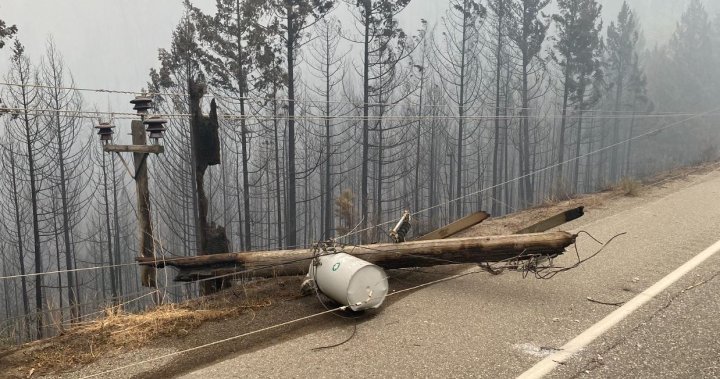Concerns are growing over a plan to shut off power in nearly a dozen communities across the Similkameen and Kootenay-Boundary regions of British Columbia to reduce wildfire risk.
FortisBC is launching a new initiative it calls the Public Safety Power Shutoff (PSPS).
The power giant says it will initiate the PSPS during extreme weather such as extreme heat and powerful wind events to reduce the chance of trees and branches making contact with live powerlines and igniting fires.
However, the initiative has many people, including residents, business owners in affected communities and local governments, expressing some serious concerns.
Some of those concerns were brought up on Thursday at the Regional District of Okanagan-Similkameen’s (RDOS) board meeting, where Fortis representatives outlined the plan.
“I’m sorry. It’s not acceptable,” Princeton mayor Spencer Coyne told Fortis at the RDOS meeting.
“When it’s 40-plus degrees out, people are going to start dying because they don’t have air conditioning.”
While Coyne told Fortis he understands the importance of reducing the fire risk, the policy has some serious ramifications.
“I get where you guys are coming from. I really do. But you also forget where we’re coming from,” a concerned Coyne said. “”We’re not going to have water. We’re not going to have medical services. We’re not going to have gasoline.
“Our refrigerators and our freezers are going to go down, and we’re going to lose our food. We won’t have a restaurant to go to. We won’t have a restaurant to go to. Like has any of this been taken into consideration?”
In Keremeos, another affected community, resident Jessica Johnson also expressed concerns.
“We feel incredibly vulnerable, we feel incredibly scared,” she told Global News.
Get daily National news
Get the day’s top news, political, economic, and current affairs headlines, delivered to your inbox once a day.
Johnson runs the Riverbank Acres Bed and Breakfast and said the company’s so-called ‘proactive’ outage will have a big impact on both her home and business.
“As a home and family we’re concerned about our freezers and fridges rotting full of food,” Johnson said. “There would be no air conditioning, no ability to cook for people, so that would impact us, of course, financially.”
Fortis’ corporate communications senior adviser Gary Toft said the company is hearing the concerns.
“This is not something we would do lightly. It would only be used as a last resort,” Toft said. “We are having discussions with communities and emergency services to understand what supports can be put in place.”
Coyne said that is something that should have been done prior to announcing the new policy.
“They say they’re still working on it, but if this is just something you’re thinking about, or this is something you’re still working on, that’s when you are supposed to come to all the stakeholders and get input and work with us, and then you come up with a policy,” Coyne said.
“Right now, what they’ve done is they’ve said they’re going to do this and they’ve set a wave of fear across our entire region.”
Coyne has written a letter to both the provincial government and the B.C. Utilities Commission hoping they intervene.
Johnson is also hoping the initiative doesn’t go ahead as planned.
“I just feel like they are well overplaying their cards on this,” Johnson said. “It’s one thing to be ready to go because an emergency has happened, it’s entirely another because they think something could happen, maybe. ”
The 10 communities Fortis has identified as high-risk for wildfires and where the PSPS initiative will be implemented include Princeton, Midway, Greenwood, Beaverdell, Christian Valley, Westbridge, Rock Creek, Cawston, Keremeos, and Hedley.
© 2025 Global News, a division of Corus Entertainment Inc.
Power shutoff initiative creating ‘wave of fear,’ says Princeton, B.C. mayor


